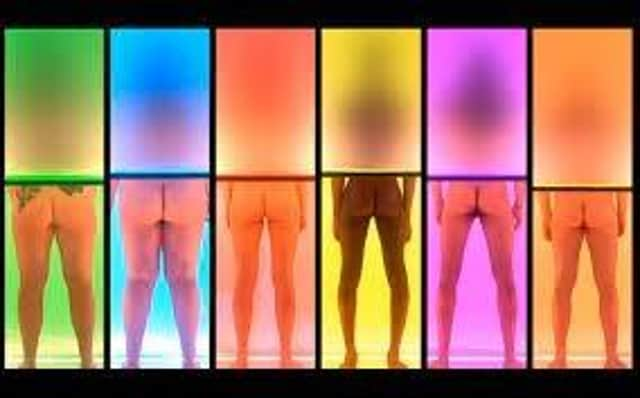Channel 4: Thin-skinned politicians must not be allowed to sell off publicly owned broadcaster – Aidan Smith


Now, obviously Thatcher didn’t specifically put pudenda on the agenda. She didn’t know that Naked Attraction would be dreamed up by some bored, randy creatives 34 years after signalling the go-ahead for a new British network. But she did say to Channel 4: “Go and make some programmes.”
Maggie could not have foreseen there would be one calledThe Word which also featured full-frontal nudity when the singer in grunge-rockers L7 doffed her jeans and knickers.
Advertisement
Hide AdAdvertisement
Hide AdOr another called After Dark, a wee-small-hours discussion show whose “open-ended” remit struck terror in the hearts of libel lawyers but produced gob-smacking moments of intellectual confrontation. Although of course it’s mainly remembered for a well-refreshed Oliver Reed trying to snog feminist Kate Millett before announcing: “Right, I’m off for a slash.”
And most likely the first pre-watershed lesbian kiss – on Brookside – wasn’t in Maggie’s mind when the great championess of free markets and entrepreneurialism encouraged Channel 4 to shake up the telly-scape and especially the BBC, which she hated. Or Queer as Folk or Brass Eye or Big Brother.
But this is what she and the rest of us got when the station went on air in 1982. This and much more like it. Daring and diabolical. Ground-breaking and switchboard-jamming. Clever and silly. Out-and-out porn, in the eyes of some, and just as offensive to others, property porn.
For how much longer, though? How likely is it that C4 will continue to stimulate, titillate and irritate, often within the space of a single programme, when in the hands of new owners, possibly foreign, and almost certainly commercially driven?
A new generation of Conservatives, led by Boris Johnson and Nadine Dorries, his Culture Secretary, want to privatise the station. The plan has sparked outrage. By what Dorries called the “Leftie lynch mob”.
This rabble includes Sir David Attenborough who, remembering her threat to abolish the BBC’s licence fee, accuses the government of “short-sighted political and financial attacks” on Britain’s public service broadcasters. So Dorries has in effect dissed the great-great-grandfather to the nation. That’s short-sightedness right there.
Why privatise? Well, Tories don’t like public service anything. They also don’t like criticism and appear incredibly thin-skinned about it. In the early months of Covid, No 10 refused to put up ministers for interview on ITV’s Good Morning Britain because of Piers Morgan’s rigorous style of interrogation. This was a dereliction of duty. The world was dark and however tough the questions, we needed to hear from politicians – yes, even the monstered Helen Whately – like never before.
It’s difficult to avoid the suspicion that the sell-off is about revenge. Dorries was made to look as out of her depth as Whately when Channel 4 News’ Krishnan Guru-Murthy challenged her over Johnson’s allegation in the Commons that Sir Keir Starmer was responsible for not prosecuting Jimmy Savile. And the same programme, in response to a no-show by Johnson for a televised debate on climate change, plonked an ice sculpture in his place which soon melted.
Advertisement
Hide AdAdvertisement
Hide AdDorries insists she likes C4 and will, of an evening, curl up on the sofa and watch Open House: The Great Sex Experiment, the current threesomes extravaganza. Okay, I made that up, she prefers Bake Off (though exposure to the former might improve the bedroom scenes in her novels). But faith that she would take good care of the station were privatisation to happen is undermined by her ignorance of how it works. She claimed in parliament that it is “in receipt of public money”. It isn’t.
I don’t want privatisation to happen, under Dorries or anyone. If it did, Channel 4 would not be Channel 4 anymore. At the moment, all the money the station makes is reinvested in new shows. A private sector owner would instead want to maximise profits and, network bosses argue, this would be at the expense of original and distinctly British programming. The quirkiness could disappear.
Aspire to the Netflix model, broadcasters are always being told. But why? We already have Netflix. C4 programmes have their own distinct flavour, even if you occasionally find an unmentionable foreign body in the soup. The telly-scape can often seem blandly homogenous. That’s despite the vast array of channels now because stations will copy each other and even C4 does this. But more often than not it’s different.
I admit to a huge soft spot for the 40-year-old unruly kid of British TV, in common with many Scots. When I worked for a tartan tabloid, second-in-command on the showbiz beat, my boss would snaffle all the set visits to the top-rated Coronation Street and EastEnders but I was more than happy to hang out with Brookside strumpets in Bev’s Bar, sit in on a live recording of The Word, meet a revelatory Kelsey Grammer as Frasier launched – and spend a few hundred quid of the paper’s money flying to the Big Smoke for an exclusive interview with Big Breakfast puppets Zig and Zag.
A good few Scottish voices have been heard in opposition to the sell-off including a Tory, Ruth Davidson, who said: “Channel 4 is publicly-owned, not publicly-funded. It doesn’t cost the taxpayer a penny… It’s one of the reasons we have such a thriving [independent programme-making] sector in places like Glasgow.”
I also liked how former Lib Dem leader Menzies Campbell mocked the urge to compare C4 unfavourably with streaming services: “How many journalists and camera crews has Netflix sent to Ukraine?” he asked.
Last word goes to comedy king Armando Iannucci: “Why do the government want to take a thriving British industry – one that puts billions into the economy and which promotes British culture and values internationally – and cut it down?” Why indeed.
Comments
Want to join the conversation? Please or to comment on this article.
